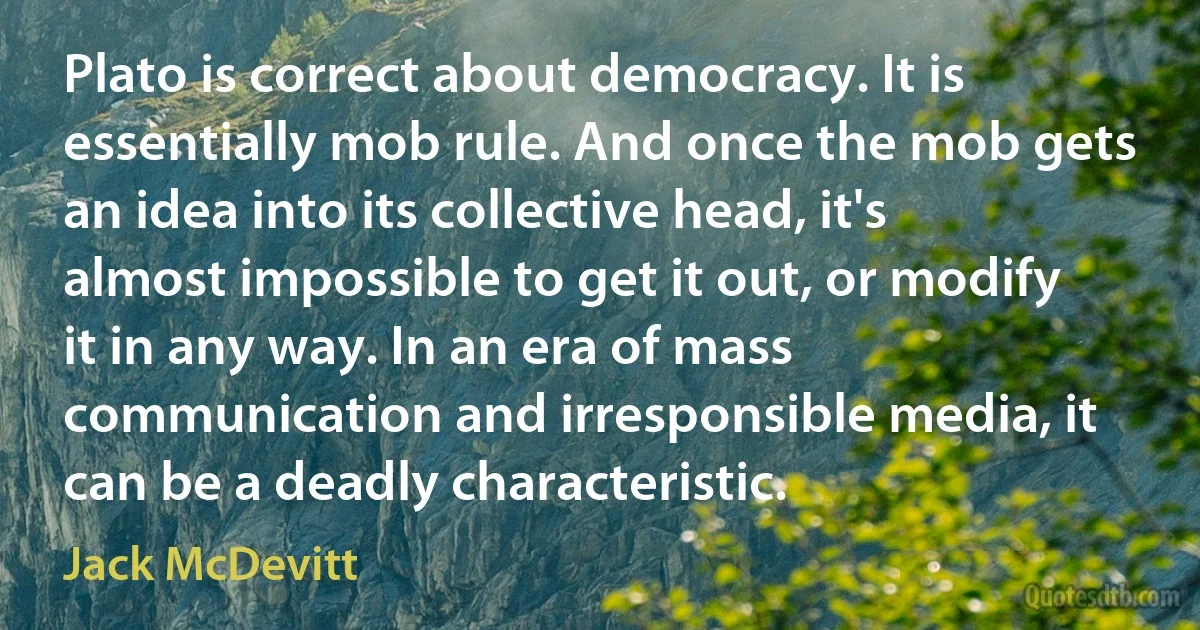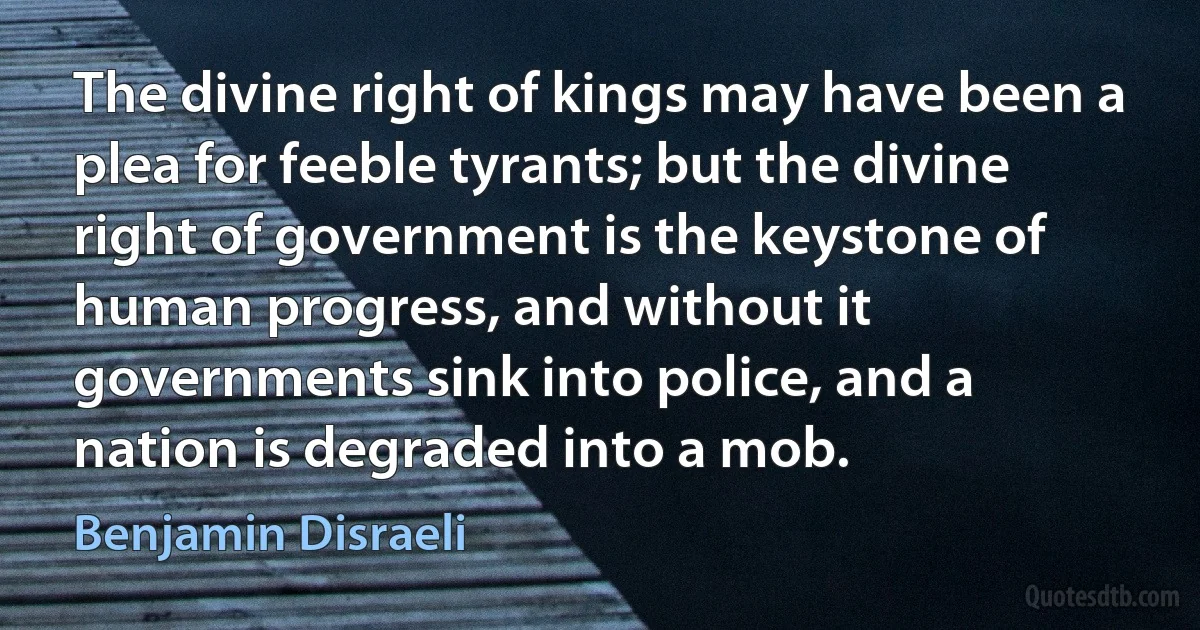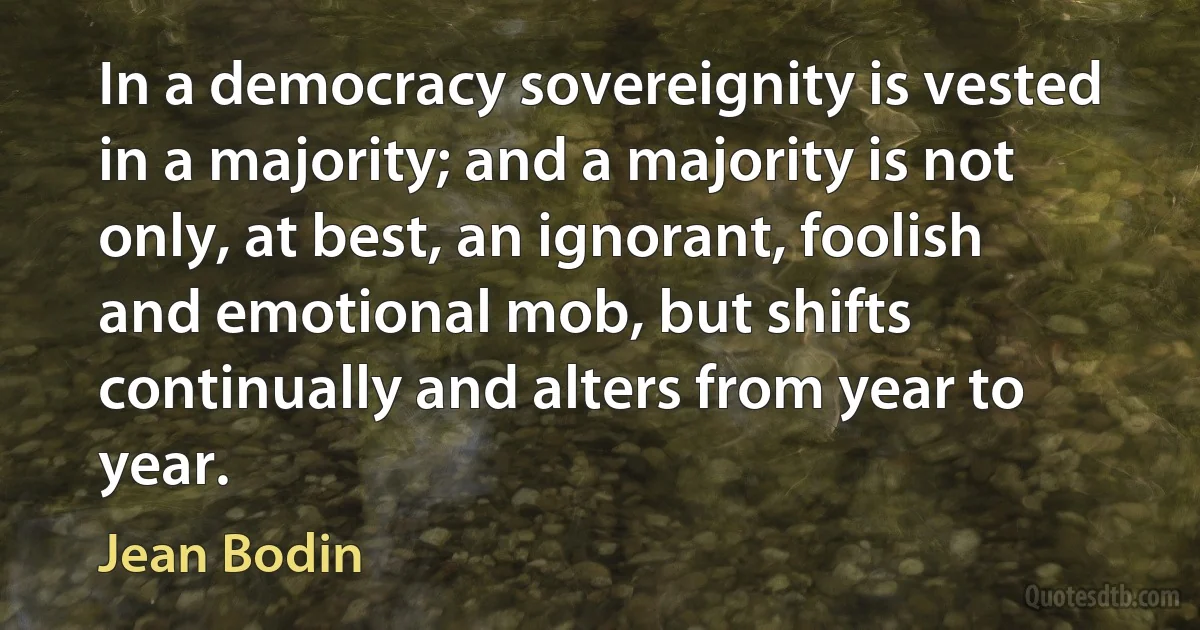Mob Quotes - page 6
Against the new leviathan, whether in the guise of universal suffrage, democracy, or of an equally fraudulent triumphant proletariat, [Kierkegaard] pitted the individual human soul made in the image of a God who was concerned about the fate of every living creature. In contrast with the notion of salvation through power, he held out the hope of salvation through suffering. The Cross against the ballot box or the clenched fist; the solitary pilgrim against the slogan-shouting mob; the crucified Christ against the demagogue-dictators promising a kingdom of heaven on earth, whether achieved through endlessly expanding wealth and material well-being, or through the ever greater concentration of power and its ever more ruthless exercise.

Malcolm Muggeridge
These economic royalists complain that we seek to overthrow the institutions of America. What they really complain of is that we seek to take away their power. Our allegiance to American institutions requires the overthrow of this kind of power. In vain they seek to hide behind the flag and the Constitution. In their blindness they forget what the flag and the Constitution stand for. Now, as always, they stand for democracy, not tyranny; for freedom, not subjection; and against a dictatorship by mob rule and the over-privileged alike.

Franklin D. Roosevelt
...Hades had opened its gates and vomited forth the basest, most despicable, most horrible demons. In the course of my life I had seen something of untrammeled human insights of horror of panic. I had taken part in a dozen battles in the First World War, had experienced barrages, gassings, going over the top. I had witnessed the turmoil of the postwar era, the crushing uprisings, street battles, meeting hall brawls. I was present among the bystanders during the Hitler Putsch in 1923 in Munich. I saw the early period of Nazi rule in Berlin. But none of this was comparable to those days in Vienna. What was unleashed upon Vienna had nothing to do with [the] seizure of power in Germany. ...What was unleashed upon Vienna was a torrent of envy, jealousy, bitterness, blind, malignant craving for revenge. All better instincts were silenced... only the torpid masses had been unchained. ...It was the witch's Sabbath of the mob. All that makes for human dignity was buried.

Carl Zuckmayer
I realized I had, unbeknownst to me, signed an invisible contract which required me to enter into a strange new echelon of society. People suddenly wanted to take pictures of me on the street. Journalists were interested in the kind of socks I preferred. ... It was an atmosphere from which I instantly wanted to retreat. I detested the superficial elevation and commodification of it all, juxtaposed with the grotesque self-involvement it would sometimes draw out in me. Being a faceless member of a mob, I soon realized, is far more comforting than teetering on a brittle pedestal one inch off the ground. The exclusion and subtle differentiation that comes with even the rather diluted form of celebrity that I have embarrasses me.

Jack Gleeson
The whole nation has come a long, long way in extending the frontiers of civil rights. If we are true to the facts, we must admit this. Twenty-five years ago, a year hardly passed when numerous Negroes were not brutally lynched by some vicious mob in the South. Today lynchings have about ceased. Twenty-five years ago, most of the states in the South had what was known as a poll-tax. The poll-tax system was cleverly contrived to keep many, many Negroes from becoming registered voters. Today the poll-tax has been eliminated in all but four states. And just a few weeks ago, Congress unanimously passed a bill amending the Constitution calling for an end to the poll-tax in all federal elections.

Martin Luther King Jr.
Human beings either function as individuals or as members of a pack. There's a switch inside us, deep in our spirit, that you can turn one way or the other. It's almost always the case that our worst behaviour comes out when we're switched to the mob setting. The problem with a lot of software designs is that they switch us to that setting.

Jaron Lanier
When men take it in their heads to-day, to hang gamblers, or burn murderers, they should recollect, that, in the confusion usually attending such transactions, they will be as likely to hang or burn some one who is neither a gambler nor a murderer as one who is; and that, acting upon the example they set, the mob of to-morrow, may, and probably will, hang or burn some of them by the very same mistake. And not only so; the innocent, those who have ever set their faces against violations of law in every shape, alike with the guilty, fall victims to the ravages of mob law; and thus it goes on, step by step, till all the walls erected for the defense of the persons and property of individuals, are trodden down, and disregarded.

Abraham Lincoln
People don't want children to know what they need to know. They want their kids to know what they ought to need to know. If you're a teacher you're in a constant battle with mildly deluded adults who think the world will get better if you imagine it is better. You want to teach about sex? Fine, but only when they're old enough to do it. You want to talk politics? Sure, but nothing modern. Religion? So long as you don't actually think about it. Otherwise some furious mob will come to your house and burn you for a witch.

Nick Harkaway
Jim Thorpe is someone I've always loved. He was an Olympic athlete, you know, and a football player from back in the day. I'd love to play him. And then there's a guy called Iceman who was a top hit man for the mob. I would love to play him. Actually, it's sort of in the works, so I hope it goes through.

Channing Tatum
Today medical school is attended by mobs, not students; a mob receives its degree, a Doctor-Mob practises the medical profession. We learn to distrust it immediately; this mob may even be armed, may even be equipped with powerful weapons. Whoever wishes to become a doctor should reflect before entering the profession; enter only if you are determined to be different and to adopt different principles and teachings. Otherwise do not enter.

Guido Ceronetti
When, in a nation, a despotic ruler grows powerful and the pillars of oppression are erected, it is necessary to effect changes. Whenever possible, they should employ good counsel and perfect advice to repel oppression. If they can, they should change the pillars of tyranny and install reformers in the place of the corrupt. If the despotic king declines to halt the oppression and to change his ministers, then naturally those who are able have the obligation to stop the oppression themselves. They should not, however, senselessly shed blood or slaughter individuals. Rather, they should employ advice and divine counsel to defeat those criminals and to change conditions. For, the power of those tyrants derives from the mob. Whenever these throngs are scattered, the despot's power is weakened. Naturally, in this situation this course of action is more insightful and more prudent.

Subh-i-Azal



